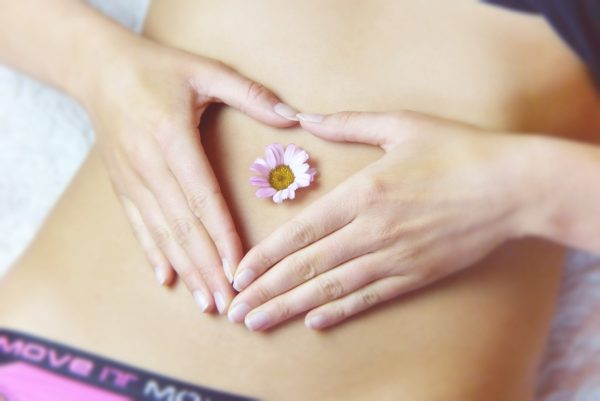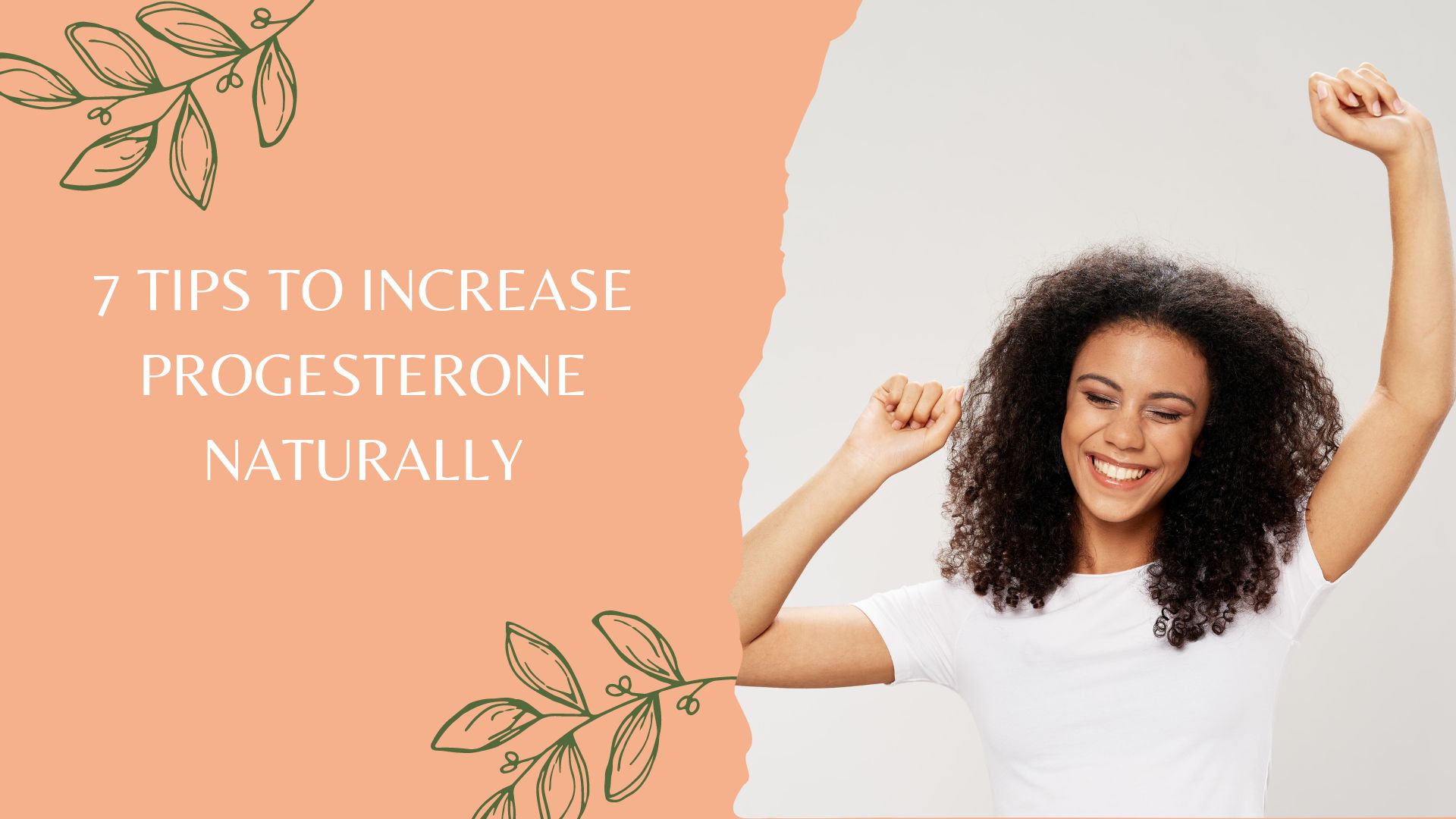
7 Tips to Increase Low Progesterone Levels Naturally
Progesterone levels naturally decline with age
Progesterone is often the first hormone that starts to decline during menopause. The level of progesterone naturally drops in women in their 40s, which is one reason why women of this age experience symptoms such as: low libido, hot flashes, depression, anxiety, menstrual cycle absence and sore breasts, to name a few.
However, the symptoms of low progesterone are already affecting many younger women and even teenagers today. We will explore now the symptoms and reasons of low progesterone levels and why yours it is so important even if you don’t want to have children and how you can increase it naturally.
Symptoms of low progesterone
You can treat a progesterone deficiency naturally. But how do you know if you’re even affected? The symptoms of a progesterone deficiency can vary:
- Low libido
- Sleep disorders
- PMS* and mood swings
- Fibroids or cysts
- Anxiety and depressive moods
- Hot flashes
- Spotting in the second half of your cycle
- Heavy painful menstrual bleeding
- Menstrual cycle less than 23 days or longer than 34 days
- Irregular Cycles
- Luteal phase (between ovulation and period) less than 9 days
- Infertility
- Miscarriage in the first trimester
- Premenstrual headaches and migraines
- Swollen and painful breasts
- Cycle has become shorter or significantly longer
- Weak bladder
*PMS: Premenstrual syndrome from 4 – 14 days before the period with insomnia, muscle and joint pain, pimples, abdominal cramps, indigestion, chest pain, depression and tearfulness.
Why are healthy progesterone levels so important?
While the hormone estrogen dominates the first half of the cycle and builds up the lining of the uterus and triggers ovulation, progesterone is dominant in the second half of the cycle. After ovulation, the so-called corpus luteum is formed in one of the woman’s two ovaries in the second half of the cycle. This produces progesterone and is along with estradiol one of the most important sex hormones in women. It ensures that the egg cell can nest in the lining of the uterus and that pregnancy is possible.
Did you know that progesterone also
- stimulates collagen formation
- prevents breast cancer
- reduces inflammation
- promotes sleep
- calms the nervous system
- makes you more stress resistant
- balances estrogen and prevents PMS symptoms
- supports the thyroid
- has a draining effect
- protects against heart disease
What causes low progesterone levels?
When we enter menopause and the ovaries stop producing progesterone, the adrenal glands continue producing it. The adrenal glands produce the anti-stress hormones adrenaline and cortisol and help regulate several bodily functions including blood pressure, metabolism, and how we react to stress.
One important thing to mention is that the longer women maintain a healthy menstrual cycle including ovulation and a stable luteal phase, the more balanced the progesterone-estrogen ratio remains in menopause and as fewer menopausal symptoms will occur.
On the one hand, chronic persistent stress leads to functional disorders of the adrenal glands (up to and including so-called “adrenal fatigue”) and also reduces the availability of progesterone. That’s why, supporting healthy adrenal function is, among other things, an essential for women to keep progesterone levels balanced.
And since we need certain macro- and micronutrients and a stable blood sugar level to produce progesterone, nutrition is also the basis for good progesterone levels during our menstrual years and as well in the peri-menopause and post-menopause years. You will receive a few tips on that in a moment.
Besides the absence of ovulation, a too short luteal or corpus luteum phase can lead to low progesterone levels. In addition to that, it is also possible that the corpus luteum does not produce enough progesterone.
However, other factors can also affect your progesterone levels:
- Chronic high stress level
- Too much or too little body fat
- Excessive physical training
- Age: progesterone levels decrease significantly after age 30
- Environmental toxins that disrupt the hormone balance
- Contraceptive pill as it prevents ovulation and stops progesterone production.
- Liver is overloaded with toxins
- Obesity and overweight
- Nutrient deficiencies of macro and micronutrients (explained further below)
- High prolactin levels outside of breastfeeding
- Breastfeeding
- Hypothyroidism (underactive thyroid)
- Hyperprolactinemia (elevated prolactin)
- Low cholesterol
- Luteal insufficiency
- Imbalanced gut flora
- Adrenal function is disturbed
- Chronic emotional stress like persistent worry, etc.
- Physical stress such as excessive training, autoimmune diseases, dieting, underweight or overweight, lack of sleep, etc. as it leads to high levels of cortisol and the production of fewer sex hormones including progesterone.
- PCOS* is also associated with a progesterone deficiency
*PCOS: Polycystic ovary syndrome as the most common hormonal disorder in young women with missed or infrequent periods, altered ovaries and increased male hormones.

Can the wrong diet produce progesterone deficiency?
There can be multiple reasons for low progesterone and the wrong diet can contribute to a progesterone deficiency like:
- Estrogens in animal products from conventional farming
- Xenoestrogens (hormone-active substances)
- Nutrient deficiency e.g. magnesium, vitamins A, B6, C, zinc, etc.
- Diet poor in carbohydrates, proteins and healthy fats
But there are ways to treat your low progesterone naturally. Since there are no side effects, it is definitely worth trying them. So that the symptoms of progesterone deficiency no longer torment you.
Can you treat low progesterone naturally?
Yes you can! There are many ways to naturally support healthy progesterone levels. But the first and most important question that every woman needs to ask herself is: Why are my progesterone levels so low in the first place?
Our goal is always to correct the root cause(s) of the deficiency and not just the symptoms. Otherwise you won’t have lasting and profound healing. Attempts to balance hormone levels with progesterone creams or capsules are not a long-term solution and often have side effects.
They don’t fix the actual problem that the body doesn’t manage to produce enough hormones itself. And in most cases, the hormonal problems don’t go away (sometimes they even get worse) – even if it’s often shown that way.
Therefore, first try to find out what could promote lower progesterone levels in you and start there. If necessary, further medical tests and diagnostics are also useful, e.g. to rule out hypothyroidism.

7 Tips to Treat Low Progesterone Naturally
Based on the factors that can trigger a progesterone deficiency, you can already start implementing the first steps that will help you to support your progesterone production.
In order to produce progesterone, the body primarily needs the right building blocks – i.e. micro and macronutrients and a stable blood sugar level. You can do that through diet. On the other hand, the body only produces enough sex hormones if it can be sure that there is no danger. Therefore, stress reduction is the second most important pillar when we want to treat progesterone deficiency naturally.
1. Calm your nervous system
Persistent stress is one of the main reasons for low progesterone levels. In the so-called fight or flight mode, the body releases stress hormones like cortisol that prevent ovulation or egg maturation and thus prevent healthy progesterone levels. That is why stress reduction, relaxation and a positive attitude to life are also an extremely important pillar for treating a progesterone deficiency naturally.
2. Evening Primrose
Evening primrose can have a positive effect on both estrogen and progesterone deficiency and stimulate ovulation. Particularly evening primrose oil is suitable. But you can also sprinkle the tasty seeds on your food.
3. Chaste tree can help
Chaste tree berry is a medicinal plant that can reduce elevated prolactin levels, stimulate luteinizing hormone (LH), promote optimal development of the corpus luteum, lengthen the luteal phase and thereby support progesterone production. See a practitioner to advise you on it.
4. Reduce or avoid coffee and alcohol
Caffeine and alcohol can stimulate the adrenal glands to release stress hormones and affect blood sugar levels – both at the expense of your progesterone levels. In addition, caffeine (like alcohol) can impair the breakdown of estrogen in the liver, so that estrogen dominance can be increased which decreases progesterone levels.
5. Take sufficient micronutrients
that support your progesterone production like:
- Vitamin C contained in kiwi, strawberries, oranges, papaya or broccoli.
- Magnesium is found in cashew nuts, green leafy vegetables such as kale and chard, pumpkin seeds, legumes, cocoa, mackerel or brown rice.
- Zinc e.g. from meat, poultry, nuts and seeds, oysters, shrimp, liver.
- Vitamin E contained in: sunflower seeds, almonds, hazelnuts, avocado, red pepper, pumpkin, asparagus, pumpkin, broccoli and mango.
- Vitamin B6 e.g. in salmon, tuna, bananas, spinach, walnuts, beef, chicken, sweet potatoes, beans and plums.
6. Eat enough healthy fats
Eat healthy fats every day because they support ovulation and progesterone production. Sources of healthy fats include avocados, coconut oil, eggs, grass-fed butter, ghee, deep-sea fish, and olive oil.
7. Maintain a healthy body weight and adequate calorie intake
In women there is a close connection between weight, body fat percentage and hormonal balance.
It often happens that women miss their periods if they eat too little or lose a lot of weight, e.g. due to one-sided low-calorie diets or because of eating disorders – often in combination with a high level of exercise.
Menstruating women should consume at least 2,000 calories per day to maintain levels of their sex hormones, including estrogen, progesterone, or testosterone.
But being overweight can also disrupt the balance of sex hormones. Because body fat produces estrogen, high levels of body fat can contribute to estrogen dominance and upset the estrogen-progesterone balance.
Some final words …
You have many options to treat your progesterone deficiency naturally with the right diet and lifestyle. Avoid strict diets, excessive sport and processed foods. A fresh and varied diet provides you with important nutrients that your body needs to function well.
